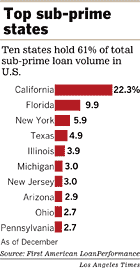This article in the NY Times today is startling. I knew that Ohio was hard hit but Cleveland is really sunk. 15000 foreclosures in 2006 (versus 2500 in 1995). A picture shows the middle class suburban neighborhood of Shaker Heights. Really nice looking houses. The city is having to spend lots of $$$ to maintain the houses and keep vandals out. In Euclid, another modest suburb, 600 foreclosures in the past two years. And this is supposedly going to get worse?
The article says that elderly and minorities were the victims of predatory lenders. I know "Let the borrower beware." But this is really sad and disturbing.
http://www.nytimes.com/2007/03/23/us/23vacant.html?th&emc=th
The article says that elderly and minorities were the victims of predatory lenders. I know "Let the borrower beware." But this is really sad and disturbing.
http://www.nytimes.com/2007/03/23/us/23vacant.html?th&emc=th

